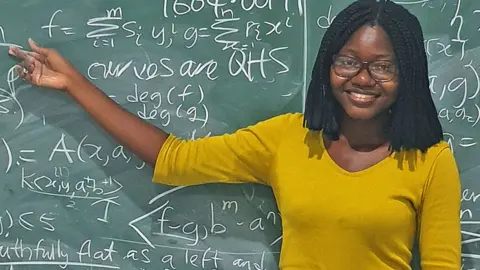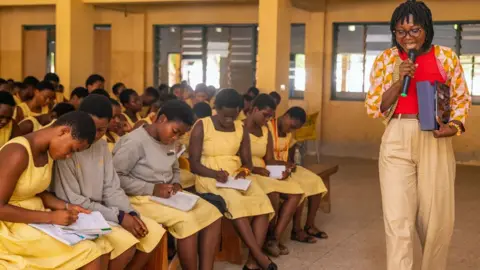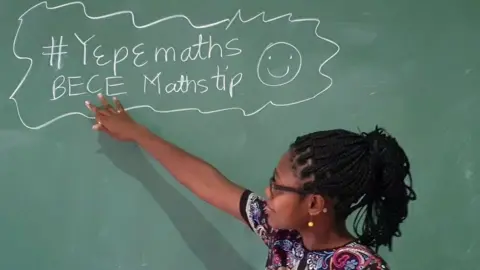The Maths Queen with a quantum mission to mentor girls
 Angela Tabiri
Angela TabiriKnown in Ghana as the Maths Queen, Dr Angela Tabiri is the first African to win The Big Internet Math Off competition - quite an achievement for someone who had not initially planned to study mathematics.
The 35-year-old Ghanaian "finds joy in solving puzzles and mathematical questions" and hopes her 2024 win will open up the world of mathematics to other African women - who have traditionally been discouraged from taking the subject.
Sixteen mathematicians were invited to compete for the tongue-in-cheek title of "the world's most interesting mathematician" - a public vote event started in 2018 by The Aperiodical blog.
The first winner was Dr Nira Chamberlain, the first black mathematician to be included in the British reference book Who's Who and a vice-president of the professional body, the Institute of Mathematics and its Applications.
During the event they all compete against each other - so two in each match - and then it goes to quarter-finals and semi-finals until the big match to decide who has explained their chosen mathematical concept in the most illuminating way.
Dr Tabiri's passion is quantum, or non-commutative, algebra, which she researches at the Ghana branch of the African Institute for Mathematical Sciences (Aims).
Aims started in South Africa and then expanded to Ghana, Senegal, Cameroon and Rwanda - to provide post-graduate training and research in science, technology, engineering and mathematics.
Dr Tabiri is also the academic manager for the Girls in Mathematical Sciences Programme, a mentoring and support scheme for high or secondary school girls in Ghana.
It was set up by Aims Ghana in 2020 to "ensure that we have a pipeline of young girls who will be leading in research and innovation in the mathematical sciences - in academia and also industry".
 Angela Tabiri
Angela TabiriDr Tabiri says the numbers of girls and boys studying maths at high school is roughly equal but then drops off at university level.
This is partly because, she says, female students assume is that if they do maths, the only job they can do is teach, because maths is still seen as a "boy's subject" - and there are very few female role models.
This is something Dr Tabiri is trying to change.
But her journey into maths was not straightforward.
She grew up in Ashaiman, one of the poorer, densely populated neighbourhoods of Tema, an industrial hub and port an hour's drive east of the capital, Accra.
Her family home was happy but noisy - she has five sisters - and Dr Tabiri would often seek out the peace and quiet of the local youth community centre so that she could study.
She wanted to follow in the footsteps of two sisters and study business administration at university.
But her grades, although high, were not high enough - and so she was accepted instead for mathematics and economics.
"It was a blessing in disguise," Dr Tabiri says. "Numbers and puzzles fascinated me - but I never thought a career in maths was for me."
In 2015, Dr Tabiri got a scholarship to do her PhD at Glasgow University in Scotland. It was hard work, she says - and it was there that she experienced a seminal moment.
She went to see Hidden Figures, the film about black American women mathematicians who worked at the US space agency, Nasa, in the 1950s, during the era of segregation in the US.
"It was amazing seeing the story of these black women told on that global stage," she remembers. "I had a lot of goose bumps watching it."
She was particularly inspired by Katherine Johnson, whose extraordinary mathematical skills and calculations were so crucial to the success of US space flights.
"Katherine Johnson worked so hard - and for a long time her work was hidden. She made me realise that I just have to keep going.
"If your work is not even recognised now, it will be recognised sometime in future. It was a real turning-point for me."
Ghana reached an historic milestone in 2024 when Dr Gloria Botchway became the first woman to graduate from the University of Ghana with a PhD in maths.
It was a journey full of hardships - including selling water and yams at the roadside as a six-year-old.
Dr Tabiri is trying to support other African girls and women from less privileged backgrounds to follow their maths dreams through her FemAfricMaths non-profit organisation.
Along with other volunteers, she gives lessons to the youngest high-school students in person and online.
She also posts on social media interviews she does with leading female mathematicians from all over the world.
Dr Tabiri is also hugely passionate about the potential of quantum science and technology - for which mathematics is essential.
She is proud that Ghana, backed by Mexico, spearheaded proposals that 2025 be declared the UN International Year of Quantum Science and Technology - on the 100th anniversary of the discovery of modern quantum mechanics.
Quantum mechanics emerged from studies to uncover how ultra-tiny particles - the most fundamental bits of matter, energy and light - interact with each other to make up the world.
It led to the development of the internet, solar cells, and global navigation satellite systems.
Researchers and big tech companies from across the world - including China, the US, the UK, Australia and South Africa - are now racing to develop quantum technologies, including quantum computers and ultra-precise measuring and sensor devices.
The hope is that complex problems will be solved at lightning speeds - and there will be huge innovations in areas like medicine, environmental sciences, food production and cyber-security.
"There are lots of conversations now - the advantages and disadvantages - the jobs that will be created," says Dr Tabiri.
 Angela Tabiri
Angela TabiriAfrica's fast-growing population, already the youngest in the world, will be the world's largest workforce by 2040, according to the UN.
"But that doesn't mean that we will get the jobs," says Dr Tabiri.
She hopes to organise a "quantum road show" as a first step in introducing schoolchildren to quantum science at a much earlier age that she was.
"We want young people to start developing an interest in and building all the relevant skills during their basic schooling," she says.
The road show will be based on a recent quantum computing course she helped organise for secondary-school girls who attend classes at Aims Ghana during their holidays.
The course discussed what it takes to build a quantum computer, its current fragilities - and the challenges quantum computing poses to current systems, such as cryptography.
Working with Unesco, Dr Tabiri will also host a week-long "Quantum Hackathon" in July at Aims-Ghana for about 40 post-graduate students from different African countries.
"We want them to use their quantum skills to solve some of the greatest challenges that we face, real-life problems," says Dr Tabiri.
"It's very urgent that we position our youth for this next big revolution."
You may also be interested in:
 Getty Images/BBC
Getty Images/BBCGo to BBCAfrica.com for more news from the African continent.
Follow us on Twitter @BBCAfrica, on Facebook at BBC Africa or on Instagram at bbcafrica
